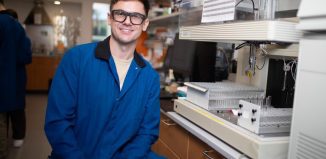SBU’s Clinton Rubin shakes up the immune system
Physical factors, such as exercise and even vibrating platforms may have profound health benefits
One way to shake up an immune system may be, in fact, to shake up the immune system.
Clinton Rubin, the chairman of the Department of Biomedical Engineering at Stony Brook, has been studying the effects of low intensity vibrations as substitutes for physical activity on bone growth in animal models. He’s found, for example, that older sheep standing on a platform that’s vibrating at a level that’s barely noticeable show bone growth.
His latest finding is that these same slightly moving platforms can also raise the level of immune cells, including T cell and B cell levels, in an obese mouse.
While it’s early to extend this to humans, the findings present the possibility that these small vibrations may help contain or even prevent significant health problems that often threaten or damage the lives of people who are significantly overweight.
“Obesity makes you susceptible to a number of disorders,” explained Rubin, who is also the director at the Center for Biotechnology. “We hope that some day, if we are able to extrapolate these findings in mice to people, that these low magnitude mechanical signals can help mitigate the health complications that arise in those that are obese.”
Rubin cautioned that these signals would not be a substitute for a healthy diet, exercise and active interaction with a physician’s advice.
Ever since he arrived at Stony Brook University in 1987, Rubin has been studying how physical factors influence the musculoskeletal system, to understand, for example, how exercise can generate a profound health benefit. He has also looked at how the removal of these physical factors, through bed rest, extended time in space, and spinal cord injuries, can affect these systems. These low intensity vibrations have served as surrogates for typical mechanical loading signals.
Recently, he has studied the effects of these small vibrations on mesenchymal stem cells (or MSC). These cells can become bone cells, cartilage or fat cells. Low intensity vibrations for as little as 10 minutes a day can bias these cells away from becoming fat cells.
Rubin suggests the process may involve a signaling pathway that mimics the way muscles move bones. Muscles are generally inefficient motors, shaking as they contract (as anyone who has challenged themselves to do a few extra push ups or do a few more reps with weights can attest). The vibrations from these plates may provide a substitute signal for the muscle vibrations.
Rubin is the chief scientific advisor for a company called Marodyne Medical, which hopes to translate his science into a medical device that can address such problems as bone wasting, muscle wasting, obesity and diabetes.
Rubin readily recognizes he has a potential conflict of interest because of his involvement with a company he hopes will one day sell a product that could offer a nonpharmaceutical alternative for people with various bone or muscle challenges.
“Do I look at this stuff with rose-colored glasses?” he asked. “As a scientist, I hope not. I try to insulate myself as much as possible from the subjects in evaluating the data.”
Rubin said the university helps him address these concerns by ensuring he provides full disclosure, in publications, grants and lectures and by informing any human subject who participates in his studies of his dual roles.
He does not interact with potential subjects in his studies and all his scientific methods are performed in a double blind fashion. That means he doesn’t know which animal received which treatment when he records results.
As for the immune system response, the benefit from these low intensity vibration is through another class of cells, called the hematopoietic stem cells (HSC).
“If these bone marrow are influenced by mechanical signals, why not HSCs?” Rubin reasoned.
Rubin and his wife, Jennifer Sigler, live in Port Jefferson with their 16-year-old son Jasper. Sigler works as an architect for the building department in their village. Jasper, meanwhile, has kept his own musculoskeletal system active by playing right defensive back for the Port Jefferson Royals, who have won back-to-back New York state class C soccer championships.
Rubin, who has been at Stony Brook since 1987, said he struggles on the Port Jefferson golf courses, but that hasn’t kept him from the links.
Rubin appreciates the support and talent of his colleagues at Stony Brook, including Assistant Professor Meilin Ete Chang and senior doctoral students Danielle Green and Ben Adler.
His work, he said, suggests that even supporting weight can send the right signals to their bodies.
“When people ask me what they should do if they can’t run or walk, I tell them stand up,” he offered.
Cast call
Cast is sought by Star Playhouse, Suffolk Y JCC, 74 Hauppauge Road, Commack for their upcoming play, “Dirty Rotten Scoundrels.” All roles are open; ages 17 and up. Prepare to sing 32 bars of contemporary theater music. Bring sheet music in the proper key and be prepared for dance audition. Call 462-9800, ext. 136, or go to starplayhouse.com for further information.
Free Irish language classes
The Gerry Tobin Irish Language School will be offering free Irish language classes beginning on Wednesday, Feb. 6, at the Ancient Order of Hibernians Hall, 27 Locust Ave., Babylon. Classes include “Mommy, Daddy and Me,” for young children and their parents. Classes for new and advanced students are also available. Call 521-1227 or go to www.scoilgaeilge.org for further information.
Seamanship course
The U.S. Coast Guard Auxiliary Flotilla 2204 will be offering a boating and seamanship course beginning on Thursday, Feb. 7, at 7 pm. Classes will be held at the Smithtown Library, 1 North Country Road, Smithtown, and runs for seven sessions.
Upon completion of the course a certificate will be awarded, satisfying the Suffolk County boaters requirements and the New York PWC operators certificate; this also covers the young boaters requirements for those under 18 years of age. Additionally, boat owners may be eligible for an insurance discount.
The course is free; there is a nominal charge for course materials. Family participation is encouraged. Call 732-3562 for further information and to register.
Pysanky Easter egg workshop
The third annual traditional Ukrainian Easter Egg (Pysanky) decorating workshop will be held on Sundays, March 10 and 17, at the Resurrection Byzantine Catholic Church, Edgewater and Mayflower avenues, Smithtown. All levels of experience are welcome. Cost of the class is $20; each participant must bring a candle in holder, pencils and roll of paper towels. Registration is required by Feb. 8. Call 246-5669.






